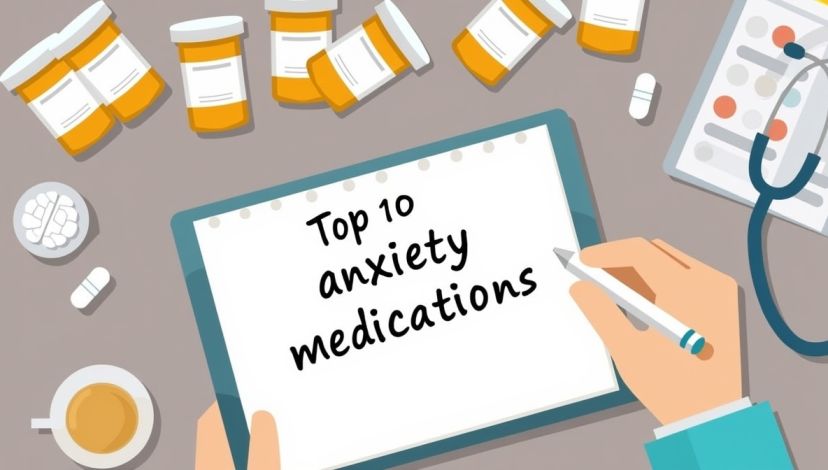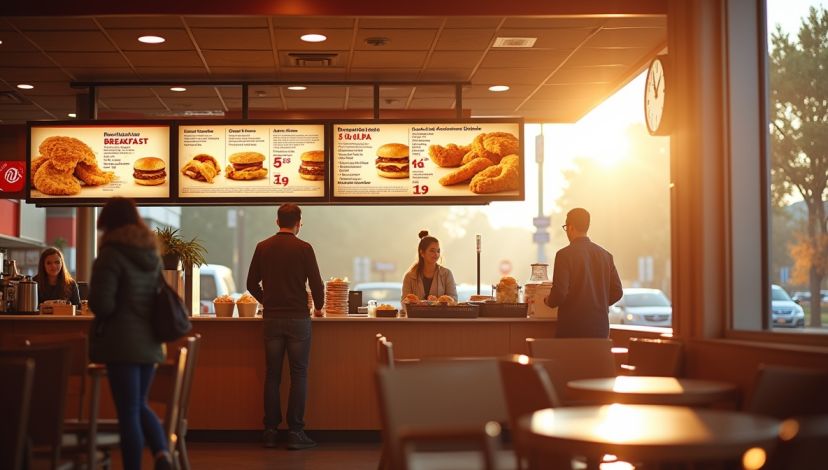Millions of people in the world are likely to experience anxiety disorders, which result in continual worry, fear, and physical problems that may interfere with the daily life. Whether it is you personally or someone close, it is important to know what treatments are out there in case of anxiety. Medication is one of the most popular and successful methods of the anxiety symptoms management. But with so many options, you might wonder, what are the top 10 medications for anxiety? The importance of this question is explained by the fact that appropriate medicine is capable of positively influencing the quality of life, whereas an inappropriate one may result in unpleasant side effects or inability to deliver relief.
The article is about the best and most prescribed medications to treat anxiety and how the medications work, including their advantages and disadvantages. This guide should offer clear and evidence-based information on which you can make an informed decision with your medical assistant to make better treatment choices, whether you are recently diagnosed or need improved treatment outcomes.
Key Takeaways:
- Anti-anxiety medication is primarily divided into SSRIs, benzodiazepines, SNRIs, and other anxiolytics, and all of them have specific advantages.
- Opting for the best medicine is based on personal symptoms, case history, and side effects.
- Treatment of anxiety is best done by a healthcare professional.
How to Select the Kinds of Anxiety Medications
There are various classes of anxiety medications, but each drug is aimed at lowering the symptoms by acting on various brain chemicals. There are the following main types:
- Selective Serotonin Reuptake Inhibitors (SSRIs): They are recommended as a primary treatment of anxiety. They elevate serotonin, which is a mood and anxiety-regulating neurotransmitter. Such medications are sertraline (Zoloft), escitalopram (Lexapro), and fluoxetine (Prozac). The preference of SSRIs is based on the fact that they are safe, non-addictive, and are effective to be used in the long term. Nevertheless, some weeks are usually needed to manifest the complete effects of them, and they can trigger such mild adverse effects as nausea or insomnia in the early stages.
- Benzodiazepines: Fast-acting drugs such as alprazolam (Xanax), lorazepam (Ativan), and diazepam (Valium) boost GABA, a calming neurotransmitter. They have rapid action on acutely experienced symptoms of anxiety, including panic attacks or extreme tension. Nonetheless, the use of benzodiazepines should not be long-term because of the potential of becoming dependent and tolerant.
- Serotonin-Norepinephrine Reuptake Inhibitors (SNRIs): Such drugs as venlafaxine (Effexor XR) and duloxetine (Cymbalta) raise the level of both serotonin and norepinephrine. They can work well against anxiety and depression, yet they can cause such side effects as raised blood pressure or tiredness.
- Others Anxiolytic: Buspirone (BuSpar), beta-blockers (propranolol), and some tricyclic antidepressants (TCAs) are included under this group. The buspirone is non-addictive and can be used in generalized anxiety disorder, though it is slower in action. Beta-blockers lessen any physical complaints, such as a fast heartbeat, primarily in cases of anxiety related to performance.
A Clinician Perspective: As per the Anxiety and Depression Association of America (ADAA), SSRIs and SNRIs, as drugs, are regarded as efficient in treating generalized anxiety disorder, as they have a good safety outcome.
What Are the Top 10 Medications for Anxiety? An In-depth Comparison
This is a comparison table with the list of the best 10 anxiety meds, including the drug class, common uses, advantages, and side effects of the drugs:
| Medication | Drug Class | Common Uses | Benefits | Common Side Effects |
|---|---|---|---|---|
| Sertraline (Zoloft) | SSRI | Generalized Anxiety, OCD | Well-tolerated, non-addictive | Nausea, insomnia, headache |
| Escitalopram (Lexapro) | SSRI | Generalized Anxiety, Depression | Low drug interactions | Fatigue, dry mouth, dizziness |
| Fluoxetine (Prozac) | SSRI | Anxiety, Depression | Long half-life, energizing | Insomnia, nervousness |
| Venlafaxine (Effexor XR) | SNRI | Anxiety, Depression | Effective for severe anxiety | Increased blood pressure, sweating |
| Duloxetine (Cymbalta) | SNRI | Anxiety, Depression | Also treats pain | Nausea, dry mouth, fatigue |
| Alprazolam (Xanax) | Benzodiazepine | Panic Disorder, Acute Anxiety | Fast-acting, effective relief | Dependence risk, drowsiness |
| Lorazepam (Ativan) | Benzodiazepine | Acute Anxiety, Insomnia | Rapid relief | Sedation, memory impairment |
| Buspirone (BuSpar) | Anxiolytic | Generalized Anxiety | Non-addictive, mild side effects | Dizziness, headache |
| Propranolol | Beta-blocker | Performance Anxiety | Controls physical symptoms | Fatigue, cold extremities |
| Amitriptyline | Tricyclic Antidepressant (TCA) | Anxiety, Depression | Effective for resistant cases | Weight gain, dry mouth, sedation |
Table 1: Top 10 Medications used to treat Anxiety and their characteristics, such as the drug type, indications and advantages, and disadvantages.
ALT text: Table of the best medications in each anxiety medicine category, their uses, advantages, and adversities.
In this table, one will find the most commonly prescribed medicines to treat anxiety, mentioning that the choice of treatment solely relies on the kind of anxiety and the severity of the particular symptom, and on the patient’s tolerance as well.
Ways to Find the Best Medication to Treat Anxiety: A Practical Story and Recommendations by Experts
There is no universality in the selection of the correct medication against anxiety. As an example, a 32-year-old graphic designer called Sarah was diagnosed with generalized anxiety disorder. Those medications include sertraline (Zoloft), which is an SSRI, as her doctor prescribed it first since it helped her with both anxiety and underlying depressive symptoms she had. Sarah felt better after six weeks and showed an improvement of her mood and less anxiety, with mild nausea. The dose was altered by her doctor, and her symptoms disappeared.
Conversely, Mark, a 45-year-old public speaker with severe panic attacks, was prescribed a case of alprazolam (Xanax) to begin with, which would take care of the immediate treatment and the use of cognitive behavioral therapy in one session. Benzodiazepines are quite addictive; therefore, Mark only took them in the short term as his therapist applied the long-term coping plans.
Information: Before starting or changing any medication, it is recommended to always consult a healthcare professional because a person has to individual factors, such as his or her medical history and other medications, to take into account.
Professionals point out that drug treatment should frequently be supplemented with treatment and lifestyle adjustment to achieve maximum results. According to Jane Smith, a psychiatrist, medication may offer the biochemical assistance required in the treatment of anxiety symptoms, but psychological treatment assists the patients to acquire anxiety management skills to deal with the stressors permanently.
Present and Future Trends in Anxiety Drugs (With second table)
The treatment of anxiety is actively developing, and more and more drugs and strategies are being introduced. New studies are impregnated on medications that have minimal side effects, and the possibilities of dependency are low. As an example, cannabidiol (CBD) and other new anxiolytics are studied because of their possible positive effects.
The table below illustrates trends in medication and emerging alternatives:
| Medication Type | Current Use | Emerging Trends | Notes |
|---|---|---|---|
| SSRIs | First-line treatment | Development of faster-acting SSRIs | Standard for anxiety and depression |
| Benzodiazepines | Short-term relief | Reduced use due to dependence risk | Used cautiously, often with therapy |
| SNRIs | Alternative to SSRIs | More selective agents in trials | Effective for treatment-resistant anxiety |
| Buspirone | Mild generalized anxiety | Combination therapies | Non-addictive option |
| Novel Anxiolytics (CBD, etc.) | Experimental | Clinical trials ongoing | Promising, but requires more research |
Table 2: Current and New Trends in Anxiety Medication
ALT text: Table of present applications and future trends of anxiety medication.
Note: Not all medications work on everyone; scientists are continually trying to adjust medicine with treatment specific to the person.
Conclusion
Understanding what are the top 10 medications for anxiety? is crucial for anyone seeking relief from anxiety symptoms. The ones most often prescribed would be the SSRIs (such as sertraline and escitalopram), benzodiazepines (such as alprazolam in case of temporary relief), and SNRIs (such as venlafaxine when it is more intense). Alternatives such as buspirone and beta-blockers act accordingly to certain needs, including generalized anxiety or physical symptom.
It is always under the supervision of the doctor that determines what medication is best to take, and picking the right medication really depends on your symptoms and health history, as well as any side effects. It is important to remember that medication is best accompanied with therapy and lifestyle change.
In case you or someone you know is experiencing an anxiety problem, the next move to make is to consult a medical practitioner so as to discuss these options and come up with a specialized treatment that suits them best.
Learn more about dealing with anxiety, see our corresponding article, How to Get Ozempic for Weight Loss: Easy Steps to Start, and go to the Anxiety and Depression Association of America to get professional support.
FAQs
Q 1: Which are the best safe medications against anxiety?
A: SSRIs, sertraline and escitalopram, have a relatively low degree of response and do not have a long-term addictive risk.
Q2: Is it possible to use benzodiazepines long-term as a remedy to anxiety?
A: No, benzodiazepines are advised to take on a short-term basis as there is a risk of dependence and tolerance.
Q3 What is the duration of anxiety drugs?
A: SSRIs and SNRIs require up to 8 weeks before they produce their full effects, and benzodiazepines work within a few hours.
Q4: Do benzodiazepines have non-addictive substitutes?
A: Yes, buspirone and beta-blockers are considered as non-addictive methods of treating symptoms of anxiety.
Q5: Can therapy be combined effectively with the treatments listed in what are the top 10 medications for anxiety?
A: Yes, it is quite common to achieve the best results when incorporating medication and cognitive behavioral therapy, or any other treatment measures dealing with psychology.




